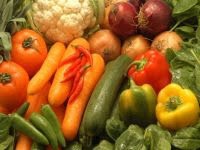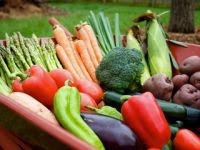Is organic food safe?
 Research has left the scientific community stunned after a new deadly multi-resistant strain of E.coli has appeared in Europe. Russia reacted immediately (sensibly), freezing all vegetable imports from the European Union until it could clarify where the source was, something it has not been able to do. Pravda.Ru special report coming this weekend.
Research has left the scientific community stunned after a new deadly multi-resistant strain of E.coli has appeared in Europe. Russia reacted immediately (sensibly), freezing all vegetable imports from the European Union until it could clarify where the source was, something it has not been able to do. Pravda.Ru special report coming this weekend.

We would like to introduce the theme with excellent research work undertaken by Brazilian journalists Fernanda Aranda, Lívia Machado e Yara Achôa, writing for IG São Paulo* on organic foods, after the death of at least 37 people in Europe, with one quarter of those affected presenting horrifying symptoms - fits, strokes and coma, associated with Haemolytic Uremic Syndrome (HUS), a complication of E.coli infection.
The research work we translated from the IG site is based upon seven points.
1. Is organic produce totally free from chemical substances?
Yes. According to Flávia Morais, nutritionist (Rede Mundo Verde): "To be organic, food must be grown without any chemicals, whether synthetic soluble fertilizers, pesticides or pesticides and in the case of animal products, antibiotics or hormones."
2. Are organic foods free from bacterial contamination?
No, just like any other non-organic food. "You do not perform agriculture in a sterile environment, anywhere. Any plant that is in contact with the environment can have a multitude of bacteria and fungi, "said Rogério Dias, coordinator of Agroecology at the Ministry of Agriculture.
The expert says that the cultivation of all kinds of vegetables - except those grown in water (hydroponic) - requires organic fertilizers (manure). To minimize the risk of contamination, the Brazilian law requires that manure is not used in the edible portion of food. "Additionally, we recommend that farmers submit to compost organic manure (control technique for the decomposition of organic material)."
About food contamination by E. coli bacteria, he says: "In the organic food or not, it can happen on the ground, at the hands of farmers, transportation, marketing and the actual handling of the consumer. Therefore, any product that has contact with soil must go through a rigorous cleaning/hygiene process."
3 - Do organic foods need to be washed before consumption?
Renato Caleffi Manju chef at Le Bistro - Restaurant in São Paulo which only uses organic food - says that health care with organic foods is no different from that required in the use of non-organic products. "The only caution is that the extra organic processed products, which do not use preservatives, have a lower durability."
"However, the organic fresh food, such as leafy products, have the same life-span, needs to be stored and must be thoroughly washed before consumption. One tip in the process of cleaning is to use bleach or vinegar to eliminate the bacteria." Caleffi adds that he prefers to use paper towels instead of cloth dish towels because the tissue can become house of microorganisms and infectious agents.
4 - Can we eat organic produce raw?
The food, organic or not, can be eaten raw if properly treated. "Wash under running water to remove dirt, soak for at least 20 minutes in chlorine solution. There are already available in the market chlorine tablets to be dissolved in water for cleaning. Or you can prepare the solution with a spoon (tablespoon) of bleach to 1 gallon of water. The proper cooking temperature above 70° C also kills the bacteria," says Flávia Morais, Network World Green.
Hand Hygiene: essential before handling food
The cleaning, preparation and cooking of organic products is exactly the same as for other foods, endorses Rachel Pimentel, nutrition consultant in São Paulo. To reduce the risk of contamination, she reinforces the importance of washing hands before handling food. Ideally, the expert argues, is to use antibacterial soap. Or else, detergent and soap do the job.
5 - Is the nutritional value of organic foods greater than the non-organic?
The food grown without chemicals takes this advantage, yes. A researcher at the Federal University of Parana (UFPR), Sonia Cachoeira Stertz, a specialist in organics, has proven that these products are actually healthier and more nutritious. 
"First, they do not have pesticide residues. Then, by using natural fertilizers, they are more nutritionally balanced. "She conducted a survey of 10 different products, including milk, strawberries and potatoes. The results: organic milk has 40% to 80% more antioxidants, the strawberry has more minerals and potatoes more nutrients than conventional ones.
"Studies show that organic foods are really rich in antioxidant substances that prevent aging and reduce the risk of cardiovascular disease. Research that compared the nutritional value of organic foods has shown that the amount of minerals like magnesium and iron were higher than in non-organic food,"added the nutritionist Flávia Morais.
6 - Do organic foods make you put on weight?
Regarding caloric values, they have more or fewer calories than conventional ones, although they are richer in micronutrients, vitamins and minerals. And precisely because of this greater nutritional potential, according to Rogério Dias, an expert from the Ministry of Health, the organs may act on the "hidden hunger", helping weight loss. "Hidden hunger is caused by nutrient deficiency. Consuming a richer food, one tends to stay in better balance and more satisfied."
7 - Do organic foodstuffs have to have a warranty stamp?
It is not only not using pesticides that defines whether a product is organic or not. To get the certificate that guarantees the title, producers must fit into more than 50 different standards of production and marketing, including storage, labeling, transport and supervision. Among the requirements are the preservation of biological diversity of ecosystems, the correct management of waste, the use of processes that increase soil fertility, and the inclusion of sustainable practices.
Under no circumstances is it allowed to use genetically modified seeds, chemical fertilizers, or hormones and antibiotics in animals. Since the beginning of the year, the certificate of organic products has become a single label around the country, the Brazilian System of Organic Conformity Assessment (Sisorg).
* "7 fatos sobre alimentos orgânicos
O cultivo sem o uso de agrotóxicos os torna mais saudáveis, mas não isentos de riscos. Saiba mais
Fernanda Aranda, Lívia Machado e Yara Achôa, iG São Paulo"
Read the original in Portuguese:
http://saude.ig.com.br/alimentacao/7+fatos+sobre+alimentos+organicos/n1597034005314.html
Translation for Portuguese version
Sally White
Pravda.Ru
Subscribe to Pravda.Ru Telegram channel, Facebook, RSS!


